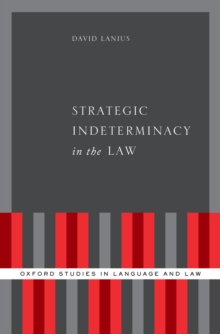
Legal Integration and Language Diversity : Rethinking Translation in EU Lawmaking Hardback
by C.J.W. (J.S.D. candidate, J.S.D. candidate, Yale University) Baaij
Part of the Oxford Studies in Language and Law series
Hardback
Description
How can the European Union create laws that are uniform in a multitude of languages?
Specifically, how can it attain both legal integration and language diversity simultaneously, without the latter compromising the former?
C.J.W. Baaij argues that the answer lies in the domain of translation.
A uniform interpretation and application of EU law begins with the ways in which translators and jurist-linguists of the EU legislative bodies translate the original legislative draft texts into the various language versions.
In the European Union, law and language are inherently connected.
The EU pursues legal integration, i.e. the incremental harmonization and unification of its Member States' laws, for the purpose of reducing national regulatory differences between Member States.
However, in its commitment to the diversity of European languages, its legislative institutions enact legislative instruments in 24 languages.
Language Diversity and Legal Integration assesses these seemingly incompatible policy objectives and contemporary translation practices in the EU legislative procedure, and proposes an alternative, source-oriented approach that better serves EU policy objectives.
Contrary to the orthodox view in academic literature and to the current policies of the EU, this book suggests that the English language version should serve as the original and only authentic legislative text.
Translation into the other language versions should furthermore avoid prioritizing clarity and fluency over syntactic correspondence and employ neologisms for distinctly EU legal concepts. Ultimately, Baaij provides practical solutions to the conflict between the equality of all language versions, and the need for uniform interpretation and application of EU law.
Information
-
Out of stock
- Format:Hardback
- Pages:312 pages
- Publisher:Oxford University Press Inc
- Publication Date:05/04/2018
- Category:
- ISBN:9780190680787
Information
-
Out of stock
- Format:Hardback
- Pages:312 pages
- Publisher:Oxford University Press Inc
- Publication Date:05/04/2018
- Category:
- ISBN:9780190680787










